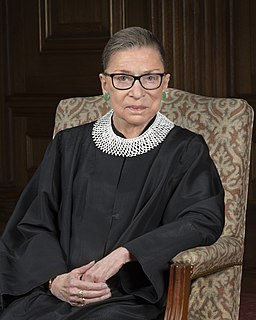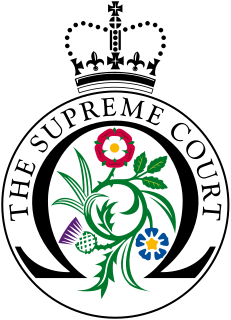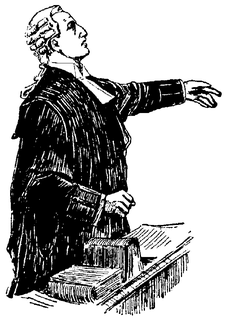
Associate Justice of the Supreme Court of the United States is the title of all members of the Supreme Court of the United States other than the Chief Justice of the United States. The number of associate justices is eight, as set by the Judiciary Act of 1869.

The Supreme Court of the United States is the highest court in the federal judiciary of the United States. Established pursuant to Article III of the U.S. Constitution in 1789, it has original jurisdiction over a narrow range of cases, including suits between two or more states and those involving ambassadors. It also has ultimate appellate jurisdiction over all federal court and state court cases that involve a point of federal constitutional or statutory law. The Court has the power of judicial review, the ability to invalidate a statute for violating a provision of the Constitution or an executive act for being unlawful. However, it may act only within the context of a case in an area of law over which it has jurisdiction. The court may decide cases having political overtones, but it has ruled that it does not have power to decide nonjusticiable political questions. Each year it agrees to hear about one hundred to one hundred fifty of the more than seven thousand cases that it is asked to review.

The Chief Justice of the United States is the chief judge of the Supreme Court of the United States, and as such the highest-ranking judge of the federal judiciary. Article II, Section 2, Clause 2 of the Constitution grants plenary power to the President of the United States to nominate, and with the advice and consent of the United States Senate, appoint a chief justice, who serves until they resign, are impeached and convicted, retire, or die.

Sandra Day O'Connor is a retired Associate Justice of the Supreme Court of the United States, who served from her appointment in 1981 by President Ronald Reagan until her retirement in 2006. She was the first woman to serve on the Court.

Thurgood Marshall was an American lawyer, serving as Associate Justice of the Supreme Court of the United States from October 1967 until October 1991. Marshall was the Court's 96th justice and its first African-American justice. Prior to his judicial service, he successfully argued several cases before the Supreme Court, including Brown v. Board of Education.
The judiciary is the system of courts that interprets and applies the law in the name of the state. The judiciary can also be thought of as the mechanism for the resolution of disputes. Under the doctrine of the separation of powers, the judiciary generally does not make statutory law or enforce law, but rather interprets law and applies it to the facts of each case. However, in some countries the judiciary does make common law, setting precedent for other courts to follow. This branch of the state is often tasked with ensuring equal justice under law.
This page serves as an index of lists of United States Supreme Court cases. The United States Supreme Court is the highest federal court of the United States.

The Supreme Court of Canada is the highest court of Canada, the final court of appeals in the Canadian justice system. The court grants permission to between 40 and 75 litigants each year to appeal decisions rendered by provincial, territorial and federal appellate courts. Its decisions are the ultimate expression and application of Canadian law and binding upon all lower courts of Canada, except to the extent that they are overridden or otherwise made ineffective by an Act of Parliament or the Act of a provincial legislative assembly pursuant to section 33 of the Canadian Charter of Rights and Freedoms.
Certiorari, often abbreviated cert. in the United States, is a process for seeking judicial review and a writ issued by a court that agrees to review. A certiorari is issued by a superior court, directing an inferior court, tribunal, or other public authority to send the record of a proceeding for review.

Ruth Bader Ginsburg is an Associate Justice of the Supreme Court of the United States. Ginsburg was appointed by President Bill Clinton and took the oath of office on August 10, 1993. She is the second female justice of four to be confirmed to the court. Following O'Connor's retirement, and until Sotomayor joined the court, Ginsburg was the only female justice on the Supreme Court. During that time, Ginsburg became more forceful with her dissents, which were noted by legal observers and in popular culture. She is generally viewed as belonging to the liberal wing of the court. Ginsburg has authored notable majority opinions, including United States v. Virginia, Olmstead v. L.C., and Friends of the Earth, Inc. v. Laidlaw Environmental Services, Inc.

The Federal Government of the United States is the national government of the United States, a federal republic in North America, composed of 50 states, a federal district, five major self-governing territories, and several island possessions. The federal government is composed of three distinct branches: legislative, executive, and judicial, whose powers are vested by the U.S. Constitution in the Congress, the President, and the federal courts, respectively. The powers and duties of these branches are further defined by acts of congress, including the creation of executive departments and courts inferior to the Supreme Court.
The Supreme Court of the State of New York is the trial-level court of general jurisdiction in the New York State Unified Court System. It is vested with unlimited civil and criminal jurisdiction, although outside New York City it acts primarily as a court of civil jurisdiction, with most criminal matters handled in County Court.

The United States Court of Appeals for the Ninth Circuit is a U.S. Federal court with appellate jurisdiction over the district courts in the following districts:
The chief justice is the presiding member of a supreme court in any of many countries with a justice system based on English common law, such as the Supreme Court of Bangladesh, the Supreme Court of Canada, the Supreme Court of Singapore, the Court of Final Appeal of Hong Kong, the Supreme Court of Japan, the Supreme Court of India, the Supreme Court of Pakistan, the Supreme Court of Nigeria, the Supreme Court of Nepal, the Constitutional Court of South Africa, the Supreme Court of Ireland, the Supreme Court of New Zealand, the High Court of Australia, the Supreme Court of the United States, and provincial or state supreme courts/high courts.

The Supreme Court of India is the highest judicial court and the final court of appeal under the Constitution of India, the highest constitutional court, with the power of judicial review. Consisting of the Chief Justice of India and a maximum of 31 judges, it has extensive powers in the form of original, appellate and advisory jurisdictions.

The Chief Justice of India (CJI) is the head of the judiciary of India and the Supreme Court of India. The CJI also heads their administrative functions.

The Supreme Court is the final court of appeal in the UK for civil cases, and for criminal cases from England, Wales and Northern Ireland. It hears cases of the greatest public or constitutional importance affecting the whole population.

The United States Reports are the official record of the rulings, orders, case tables, in alphabetical order both by the name of the petitioner and by the name of the respondent, and other proceedings of the Supreme Court of the United States. United States Reports, once printed and bound, are the final version of court opinions and cannot be changed. Opinions of the court in each case are prepended with a headnote prepared by the Reporter of Decisions, and any concurring or dissenting opinions are published sequentially. The Court's Publication Office oversees the binding and publication of the volumes of United States Reports, although the actual printing, binding, and publication are performed by private firms under contract with the United States Government Publishing Office.
The supreme court is the highest court within the hierarchy of courts in many legal jurisdictions. Other descriptions for such courts include court of last resort, apex court, and highcourt of appeal. Broadly speaking, the decisions of a supreme court are not subject to further review by any other court. Supreme courts typically function primarily as appellate courts, hearing appeals from decisions of lower trial courts, or from intermediate-level appellate courts.












